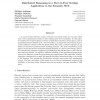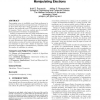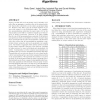417 search results - page 31 / 84 » Some Theory for Generalized Boosting Algorithms |
ATAL
2007
Springer
14 years 3 months ago
2007
Springer
Agents engaged in noncooperative interaction may seek to achieve a Nash equilibrium; this requires that agents be aware of others’ rewards. Misinformation about rewards leads to...
JAIR
2006
13 years 9 months ago
2006
In a peer-to-peer inference system, each peer can reason locally but can also solicit some of its acquaintances, which are peers sharing part of its vocabulary. In this paper, we ...
ATAL
2006
Springer
14 years 22 days ago
2006
Springer
Encouraging voters to truthfully reveal their preferences in an election has long been an important issue. Previous studies have shown that some voting protocols are hard to manip...
EDBT
2009
ACM
14 years 3 months ago
2009
ACM
Privacy models such as k-anonymity and -diversity typically offer an aggregate or scalar notion of the privacy property that holds collectively on the entire anonymized data set....
NIPS
2008
13 years 10 months ago
2008
CAPTCHAs are computer-generated tests that humans can pass but current computer systems cannot. CAPTCHAs provide a method for automatically distinguishing a human from a computer ...



